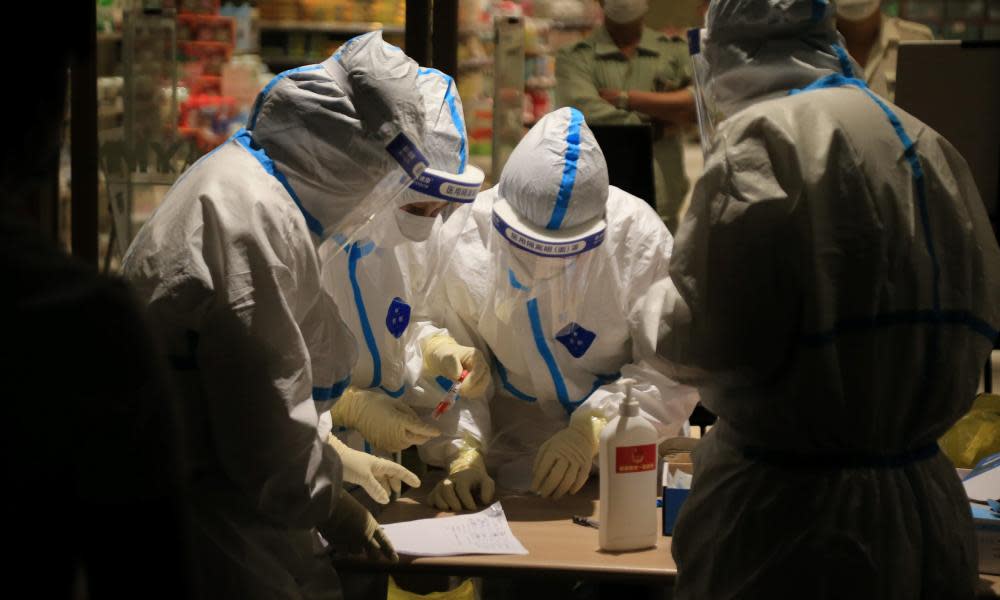Hong Kong imposes restrictions as Covid-19 cases rise across Asia

China, Australia and Hong Kong have all reported rising coronavirus figures and Vietnam has detected its first locally transmitted cases since April, as countries across Asia try to fend off an apparent second wave of infections.
Hong Kong banned dining out and capped group gatherings at two on Monday after recording more than 100 new cases for five days running. Authorities in the densely populated city have also closed pools and sports venues and made mask-wearing mandatory in public, urging people to stay home as much as possible in the middle of a sweltering summer.
“The next two to three weeks will be critical. We need to prevent the further spread of the disease in the community,” said Hong Kong’s chief secretary, Matthew Cheung Kin-chung. “There is a high risk of a major outbreak in the community.”
While hugely successful at suppressing the virus in the early months of the pandemic, the recent rise in infections has alarmed residents and authorities. More than half of its 2,634 confirmed cases have been recorded in July alone. Twenty people have died.
China recorded 61 new cases on Monday, its biggest daily rise since April. The new figures were driven by clusters in three regions, including in Xinjiang in the north-west, where a sudden outbreak in the regional capital Urumqi caused alarm in mid-July. The other cases were reported in Liaoning and Jilin provinces in the north-east, both of which border North Korea.
Authorities in South Korea said on Monday that a defector who recently fled to the North does not appear to have contracted Covid-19, a day after Pyongyang imposed a lockdown near the border and said the defector was displaying symptoms.
On Sunday authorities in Urumqi launched a second round of mass testing in an attempt to detect residents who might previously have recorded false negative results, according to the state-run Global Times.
Experts still have not confirmed the origin of the recent Xinjiang cluster, which has infected 178 people to date. The fresh infections in Jilin were announced just days after the Chinese president, Xi Jinping, concluded a tour of the province.
In Australia, the premier of the state of Victoria pleaded with citizens not to go to work if they had even the mildest symptoms, after 532 new cases helped set a daily record for the country. Of the six new deaths recorded in the state, five were in aged care facilities.
Related: Tsunami of fake news hurts Latin America's effort to fight coronavirus
Melbourne and the adjacent Mitchell Shire are nearly halfway through a six-week lockdown, but premier Daniel Andrews said further restrictions could be introduced. The state’s chief health officer, Brett Sutton, warned of further deaths to come in aged care homes, where there are nearly 700 cases across multiple homes.
“The residents in these facilities will be people’s parents, grandparents, great-grandparents and they are at significant risk of dying. That’s an inescapable fact in these settings,” Sutton said, adding that the mortality in aged care outbreaks was “extremely high”.
Vietnam said it was evacuating 80,000 people from the central city of Danang and reimposing disease-prevention measures, after four local coronavirus cases were detected, the first to be recorded in the country for more than three months.
Life had returned to normal for many in the country, which had been praised widely for taking quick action to contain Covid-19 and was on the brink of reaching 100 days without any new local infections. On Saturday, however, a 57-year-old man was confirmed to have tested positive, in the first community infection since April.
Social distancing measures have been introduced indefinitely across Danang, a tourist hotspot, with all religious, sports and cultural events suspended. Wearing masks in public places in the city is now compulsory and gatherings of more than 30 people at public places are banned, the government said.
India has recorded nearly 50,000 new daily cases, the highest daily tally so far, according to the ministry of health and family welfare. Total infections stood at more than 1.4m. It capped the end of the country’s deadliest week of the pandemic, according to the Times of India, which reported that total cases had grown by 28% and the death toll had jumped by 19%. In July alone, the capital, Delhi, added 2m new cases.
The Indian prime minister, Narendra Modi, urged citizens to be “extra vigilant” in his monthly radio address on Sunday: “We have to bear in mind that corona is as fatal today as it was in the beginning – that’s why we have to be fully cautious.”
On Monday, Modi launched three new “high throughput” Covid-19 testing facilities – in Noida on the eastern outskirts of Delhi, in Mumbai and Kolkata – to increase testing capacity.
In other coronavirus developments:
Global infections stand at just under 16.2 million, with nearly 650,000 deaths, according to Johns Hopkins University figures.
Japan’s economy minister says the government will urge businesses to aim for 70% telecommuting and enhance other social distancing measures amid a rise in cases among workers, some infected during after-work socialising, Reuters reports.
Cases in Papua New Guinea have nearly doubled in a weekend, with the emerging pandemic threatening to overwhelm the country’s already-fragile healthcare system.
New Zealand has reported zero cases of Covid-19 for the third day in a row.

 Yahoo News
Yahoo News 
